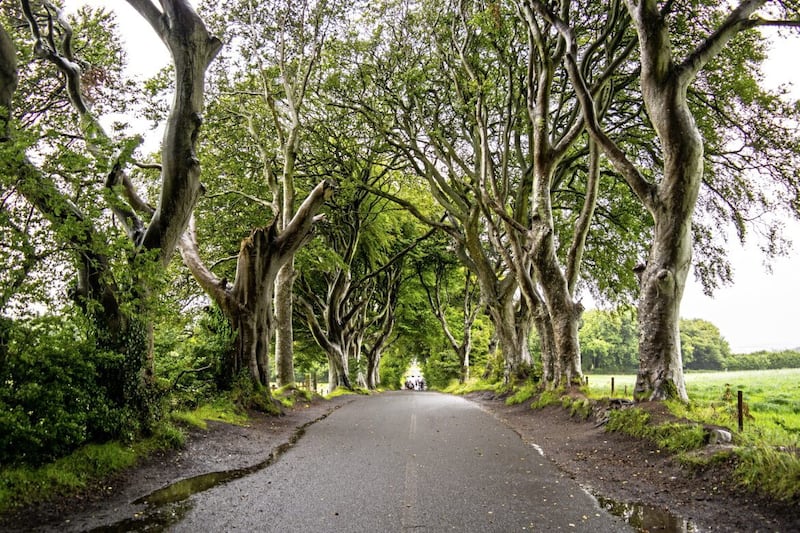MANY of the shops flooded in Newry and elsewhere have been uninsurable for years, yet Stormont’s advice to flood-prone businesses is simply to get insurance.
There is no equivalent of Northern Ireland’s innovative Homeowner Flood Protection Grant, which pays 90 per cent up to £10,000 to install equipment such as watertight door fittings. Although this scheme would be inadequate for most business premises, it would be ideal for many independent town-centre retailers. One bureaucratic obstacle to extending it to them is that they are usually tenants, not property owners, but that is hardly insurmountable.
As for the cost, the special economic value of town centres is already recognised and funded in many ways. Newry city centre’s most recent public realm scheme, in 2021, cost £2.2 million. There is little point investing in new pavements, benches and lighting if every flood will destroy a town’s commercial life.
Read more:
- Downpatrick left ‘hopeless' by floods, as water fails to recede
- Newry flooding: Funeral home and clothing store underwater as pedestrians forced to travel in paddle boats
- Flood water begins to recede as Newry businesses count cost of damage
**
The flooding in Newry has raised questions about the felling of 28 oak trees last year during construction of a flood alleviation scheme. Although residents and environmentalists objected, the Department for Infrastructure strongly defended the work.
Unfortunately, the department’s word is hard to take on trust. It was less than convincing over a similar situation in south Belfast last year, which was also followed by flooding.
**

Labour leader Sir Keir Starmer is defying significant sections of his party over a ceasefire in Gaza. He is facing resignations, protests, hostile audiences and occasional angry mobs. Imagine what his view is now on Sir Jeffrey Donaldson still refusing to defy two or three DUP holdouts over Stormont.
Labour has also made headlines by selecting party activist Liam Conlon for a safe seat in south London. Conlon’s mother is Sue Gray, Starmer’s chief of staff, controversially recruited in March from the civil service, where she was second in command at the Northern Ireland Office.
There is particular concern at this in Labour’s Northern Ireland branch. Conlon is chair of the Labour Party Irish Society, which opposes the branch’s campaign to be allowed to stand here in elections.
**
Sinn Féin has faced internal and external dissent by not calling for the expulsion of Israel’s ambassador to Ireland. The party usually makes this call during violence in Gaza, most recently in 2021. Its policy had changed but is now being changed back, with Mary Lou McDonald calling for the ambassador to “no longer enjoy diplomatic status”.
Sinn Féin’s flip-flopping on the question is partly due to having to explain why it has previously met with Hamas. Challenged about this last month on RTÉ, McDonald said “if you are serious” about peace “you meet and talk to everybody”.
This is not compatible with demanding a diplomat be removed from the country, hence why Sinn Féin has not gone quite that far - yet.
Read more:
Newton Emerson: Competence or culture war? The DUP's dilemma
Newton Emerson: Why can't Jeffrey Donaldson do the Stormont show for real?
Newton Emerson: What if Sinn Féin boycotted DUP's 'east-west council'?
**
Civil servants have been told by their line managers to prepare for Stormont’s return “within weeks”, according to the Belfast Telegraph. However, the “Stormont sources” quoted were weeks out of date.
There was a burst of optimism last month when officials believed the DUP might restore devolution after the King’s speech on November 7, which sets out the government’s legislative agenda. But hope has faded as that date approaches with no sign of movement from the government or the DUP.
**
Without Stormont to approve pay rises, inflation has cut public sector pay in Northern Ireland by 7.2 per cent in real terms over the past year. Private sector pay went up 1.4 per cent in real terms, the most of any UK region.
The public sector fall is bad new for multiple reasons, yet there will still be a qualified welcome for it in one respect. It has significantly closed the public/private pay gap, with public sector wages ‘only’ 22 per cent higher, about half the difference a decade ago.
Northern Ireland has typically had the largest such gap in the UK, seen as a drag on the whole economy. Trying to address this was a key objective of the 2015 Fresh Start agreement. The executive that followed had some success but the absence of an executive has worked even better.
**
Belfast City Council has begun the search for a private investment partner for its city centre living project, which aims for 66,000 more residents by 2035. This will involve massive, mixed-use development across multiple sites. Lessons have hopefully been learned from the Tribeca fiasco, which has left swathes of the city centre falling into further dereliction. The private partner in that case, Castlebrooke Investments, is currently in a staring contest with the council and Stormont over building affordable homes. Poor planning laws mean it can sit on its crumbling assets indefinitely.
The council certainly seems embarrassed. Its promotional material to investors highlights every major development in the city except Tribeca. Apart from one label at the edge of a diagram, which appears fleetingly in a video, it is not mentioned at all.
**

Daily Telegraph travel writer Chris Morris has given Northern Ireland one of the most glowing reports it must ever have received in the British press. Having always pictured a grim little version of England, he described his first visit here a month ago as “an epiphany, a mind-altering revelation” that left him “blown away”.
Tourism chiefs should have been over the moon. Alas, Moss opened his piece by telling readers not to be deterred by last month’s story about the Dark Hedges.
So it appeared beneath the grim little headline: “There’s so much more to Northern Ireland than a road of dying trees”.








